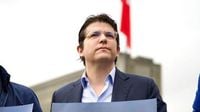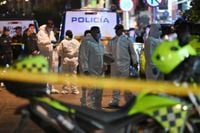In a shocking and violent incident that has sent ripples through Colombia’s political landscape, Senator Miguel Uribe Turbay, a prominent presidential candidate, was shot during a campaign rally in Bogotá on Saturday, June 7, 2025. The attack took place in El Golfito Park, located in the Modelia neighborhood of the Fontibón district, where Uribe was engaging with supporters as part of his bid for the 2026 presidential election.
According to multiple sources, including Colombia’s National Police and local media, a man approached Uribe from behind and opened fire, striking the senator in the back, with some reports suggesting the bullet may have hit near the head or neck area. The senator, 39 years old and a member of the conservative Democratic Center party, was immediately rushed to the Colombia Clinic and later transferred to the Engativá Medical Center for emergency treatment. His condition was described as serious and critical by various outlets, with his wife, Maria Claudia Tarazona, poignantly stating on social media that her husband was “fighting for his life.”
Video footage circulating on social media captured the chaotic aftermath of the shooting. In the clips, Uribe is seen lying on the ground with blood pouring from his head and back, supported by two men—one applying pressure to his wound to control the bleeding—as panicked supporters called for an ambulance. The scene was one of shock and urgency, with people screaming and scrambling for help while law enforcement quickly responded to the crisis.
Bogotá’s Mayor Carlos Fernando Galán confirmed that Uribe was receiving emergency medical care following the attack and announced that the suspected shooter had been apprehended by authorities. “Senator Miguel Uribe is receiving emergency care after being the victim of an attack this afternoon in Fontibón. The shooter has been captured. The entire Bogotá hospital network is on alert in case he needs to be transferred,” Galán wrote on X (formerly Twitter), expressing his solidarity with Uribe and his family during this harrowing time.
Colombia’s Defense Minister Pedro Sanchez also confirmed the arrest of a suspect and revealed that investigations were ongoing to determine if others were involved in the attack. Sanchez visited Uribe at the hospital, underscoring the gravity of the situation. The government has offered a substantial reward of approximately $730,000 for information leading to further clarity on the incident.
The Democratic Center party, which Uribe represents, issued a strong condemnation of the shooting, labeling it as an “unacceptable act of violence.” The party’s statement detailed that the senator was shot by “armed subjects” during a public campaign event in a park in the Fontibón neighborhood but withheld specific updates on his condition. The Colombian presidency echoed this condemnation, stating that the government “categorically and forcefully” rejected the attack and called for a thorough investigation into the violent incident.
President Gustavo Petro, Colombia’s leftist leader who has been a political adversary of Uribe and his party, expressed sympathy with the senator’s family in a heartfelt message on X. “I don’t know how to ease your pain. It is the pain of a mother lost, and of a homeland,” Petro wrote, referencing the deep wounds the country continues to bear from its history of violence.
The shooting has drawn international attention as well. U.S. Secretary of State Marco Rubio condemned the attempted assassination in the strongest terms and controversially linked the violence to what he described as President Petro’s “inflammatory rhetoric.” This accusation adds another layer of tension to Colombia’s already fraught political environment.
Miguel Uribe Turbay is no stranger to Colombia’s history of violence. Born on January 28, 1986, in Bogotá, he hails from a politically prominent family. His mother, Diana Turbay, was a journalist kidnapped in 1990 by an armed group under the command of the notorious Medellín cartel leader Pablo Escobar. Tragically, she was killed in a botched rescue operation in 1991, just days before Miguel’s fifth birthday. His grandfather, Julio César Turbay Ayala, served as Colombia’s president from 1978 to 1982, marking the family’s long-standing involvement in national affairs.
Uribe’s political career began early. He served as Bogotá City Councilor from 2012 to 2015, becoming the youngest person to hold the position and even presiding over the council in 2014. He has since been a vocal critic of the current government led by President Petro and aligns politically with former President Álvaro Uribe Vélez, founder of the Democratic Center party, although the two are not related.
The attack on Uribe highlights the persistent challenges Colombia faces in maintaining political stability amid decades of conflict involving leftist rebels, right-wing paramilitaries, criminal organizations, and government forces. Violence has long been a tragic feature of the country’s political and social fabric, and this latest event serves as a grim reminder of the dangers faced by public figures, particularly those involved in contentious electoral battles.
Authorities continue to investigate the circumstances surrounding the shooting, including the motive and whether the suspect acted alone or as part of a larger conspiracy. The incident has sparked widespread condemnation across the political spectrum, with calls for unity and a peaceful democratic process as Colombia approaches its next presidential election.
As Miguel Uribe Turbay fights for his life, the nation watches with bated breath, hoping for his recovery and praying that this act of violence does not derail Colombia’s democratic aspirations or deepen divisions. The coming days will be crucial in understanding the full scope of the attack and its implications for a country still striving to overcome its turbulent past.



